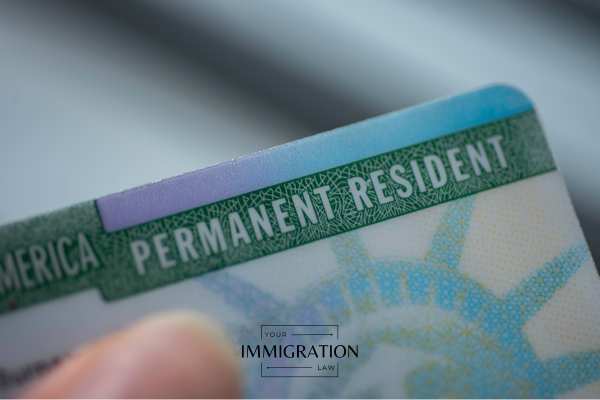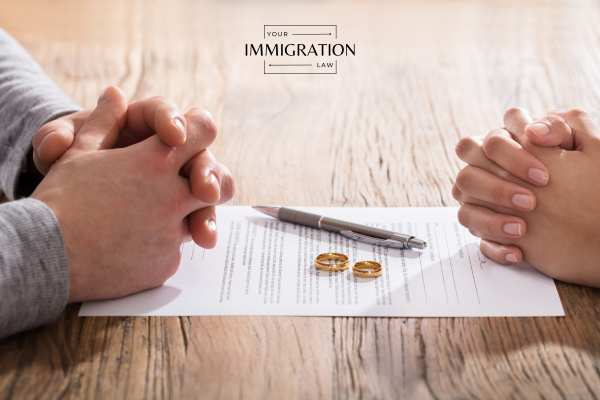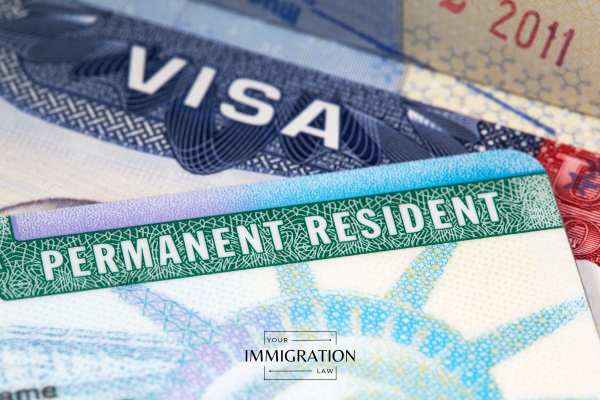Divorce can significantly impact your permanent resident status, especially if your green card was obtained through marriage. Divorcing may raise questions about your marriage-based green card. It could affect your ability to stay a resident. You must know how a divorce might affect your status. You also need to know what steps to take. This is key to staying compliant with immigration laws.
If you’re navigating a divorce and are concerned about its impact on your permanent resident status, it's crucial to seek legal advice. Call 313-631-8080 to speak to a green card attorney today. They can guide you and help you avoid issues that could threaten your residency.
Types of Permanent Residency Affected by Divorce
Divorce can impact different types of permanent residency statuses in various ways. Here's an overview of how divorce might affect different types of permanent residence:
- Conditional Permanent Residency: If you are a conditional permanent resident divorce can significantly impact your status. You have a conditional 2-year period of conditional residency. You must file a petition to remove the conditions within 90 days before your status expires. Divorce can complicate this process, but it does not necessarily disqualify you from removing the conditions.
- Family-Based Permanent Residency: A divorce might affect the status of those with a family-based permanent residency. But, it usually does not cause an automatic loss of residency. If your permanent residency is based on a petition by your spouse, consult an experienced immigration attorney to ensure you maintain your status.
- Employment-Based Permanent Residency: Divorce typically does not affect employment-based permanent residency. This status is usually based on employment and not directly tied to marital status. If you were a derivative beneficiary, a divorce could affect your status. You may need to adjust it or seek other ways to stay in the country.
- Diversity Visa Permanent Residency: For those who obtained their green card through the Diversity Visa lottery, divorce does not impact their permanent residence status. The green card is granted based on the lottery and does not rely on marital status.

Divorce can be challenging, but with proper legal advice and attention to your immigration status, you can navigate the process and protect your permanent residency.
Factors That Determine the Impact of Divorce on Permanent Resident Status
The impact of divorce on permanent resident status can vary based on several key factors. Understanding these factors can help you navigate the complexities of maintaining your status. Here are the main factors that determine how divorce might affect your permanent residence:
Status of the Marriage
If the marriage was entered into in good faith you may still be able to maintain your immigration status. You may need to provide evidence that the marriage was genuine during the process of removing conditions or adjusting your status.
If there is evidence that the marriage was fraudulent or entered into solely for immigration purposes, divorce could lead to complications. Immigration authorities may scrutinize the legitimacy of the marriage more closely.
Timing of the Divorce
If the divorce occurs before you file for adjustment of status or the removal of conditions, it could impact your application. You might still be able to proceed with the immigration application by demonstrating the bona fides of the marriage.
If you divorce after receiving permanent residence, the impact on your status is usually minimal. However, you must continue to comply with all residency requirements.
Legal Representation and Documentation
Consulting with a family immigration lawyer is crucial to understand the specific implications of divorce on your residency status. They can guide you through the necessary steps and ensure that you meet all legal requirements. Good records of your marriage and divorce can help your case. They can prove your marriage if its validity is questioned. They can also show your ongoing eligibility for permanent residency.
Compliance with Residency Requirements
Regardless of the impact of divorce, maintaining compliance with all other residency requirements is essential. This includes not committing crimes and adhering to the terms of your green card marriage status.
By understanding these factors, you can better manage the impact of divorce on your permanent resident status. You can ensure you meet all requirements for lawful residency in the U.S. Take appropriate steps to do this.
Divorce During the Green Card Application Process
If you are divorced before you file Form I-130 (Petition for Alien Relative) and Form I-485 (Application to Register Permanent Residence or Adjust Status), you are no longer eligible to apply for a green card based on marriage. The petition must be withdrawn as your eligibility is tied directly to your marriage.
If you have already filed your green card application form, but it has not yet been approved, the divorce could result in the denial of it. U.S. Citizenship and Immigration Service (USCIS) may deny the green card due to the end of the marriage. You must prove the marriage was genuine, not for immigration.

If you get a conditional green card based on a marriage under two years old, and you divorce before removing the conditions on your green card, you must apply for a waiver of the joint filing requirement. You will need to demonstrate that your marriage was entered into in good faith, despite its end.
Proving the Marriage Was in Good Faith
If the divorce occurs after filing but before the green card approval, or if you are a conditional green card holder, you must prove your marriage was in good faith. Evidence of a bona fide marriage may include:
- Photos of the couple together
- Joint financial accounts
- Joint ownership of property or mortgages
- Affidavits from family and friends attesting to the genuine nature of the relationship
The stronger your evidence, the better your chances of continuing the green card process even after a divorce.
Tips for Maintaining Your Green Card After Divorce
A divorce can make it hard to keep your green card. This is especially true if it was obtained through marriage. Divorce does not automatically lead to the loss of your permanent resident status. The impact of divorce on your residency depends on several factors, including the type of green card you hold, the timing of the divorce, and your circumstances.
If you received a two-year conditional green card through marriage, your status is valid for two years. After this period, you must apply to change the status of your conditional residence. Do this by filing Form I-751, Petition to Remove Conditions on Residence. Typically, this immigrant petition is filed jointly by both spouses.
If you are divorced, you can still file a Form I-751 petition by requesting a waiver of the joint filing requirement. To do this, you must prove that you did not enter into a bad-faith marriage and it was not fraudulent, even though it ended in divorce. You must provide proof of your marriage. This can be joint financial records, photos, and affidavits.
If you already have a permanent green card (ten-year card), divorce typically does not affect your status. Unlike a conditional green card, there are no additional steps required to remove conditions on your residency. If you plan to apply for U.S. citizenship, the divorce may impact your timeline. For those with a marriage-based green card, the naturalization process usually requires three years of residency if still married to a U.S. citizen. If you are divorced, you must wait five years before applying for citizenship.
Waivers for Conditional Green Card Holders After Divorce
Conditional green card holders who get their status through marriage may face unique challenges after a divorce. They can still retain their permanent residency by applying for a waiver. Normally, conditional green card holders must file an I-751 form with their citizen spouse. This is to adjust the conditional residency status.
If the marriage ends in divorce before the entire immigration process is complete, the conditional resident can request a waiver of the joint filing requirement. Below are the key points about waivers for conditional green card holders after divorce.
- Good Faith Marriage Waiver: This waiver request is available to those who entered into their marriage in good faith but the marriage ended in divorce or annulment. To qualify, you must prove that your marriage was not entered into for the purpose of obtaining a green card. Sufficient evidence to support your claim includes:
- Joint financial records (bank accounts, leases, insurance policies)
- Affidavits from friends and family attesting to the validity of your marriage
- Photos, communications, and other personal documentation
- Proof of cohabitation and shared responsibilities
- Battered Spouse Waiver: If you were the victim of abuse or extreme cruelty by your spouse during your marriage, you may apply for a waiver on these grounds. You must demonstrate that your marriage was entered into in good faith and provide ample evidence of the abuse. This can include:
- Police reports
- Medical records
- Restraining orders
- Statements from counselors or domestic violence shelters
- Hardship Waiver: A hardship waiver may be available if deportation would cause you extreme hardship. You must show that the hardship would go beyond the typical difficult situation of leaving the United States. This might involve proving:
- Severe health issues
- Political or social instability in your home country
- Economic hardship
- Lack of family support abroad
If you are seeking a waiver after a divorce, you will need to submit Form I-751 on your own, along with the appropriate documentation to prove your case. The process includes:
- Filling out Form I-751, checking the box indicating which waiver you are seeking
- Submitting evidence that supports your claim
- Providing the final divorce decree if you are applying for a good faith marriage waiver
- Including any additional evidence of abuse, hardship, or other relevant factors

When filing for a waiver, immigration officials at USCIS will carefully scrutinize your application to ensure that your marriage is bona fide. It is important to gather as much documentation as possible and present a clear narrative of your relationship and its challenges. If USCIS believes the marriage was fraudulent or that you do not meet the requirements for a divorce waiver, your application may be denied.
Steps to Take When Facing Divorce as a Permanent Resident
Divorce can be tough for a permanent resident. This is true if your immigration status is tied to your marriage. However, knowing the steps can help you. It can protect your rights and residency. Here are the steps to take when facing divorce as a permanent resident:
- Consult with an Immigration Attorney: Divorce can create complex situations for immigration, particularly if you are on a conditional green card. Consulting with an experienced family immigration attorney can help you understand your options and prepare you to navigate the legal challenges ahead.
- Gather Evidence of a Bona Fide Marriage: Whether you are applying to remove conditions on your green card or preparing for naturalization, it is essential to have evidence that your marriage was genuine. Collect documents such as:
- Joint financial records (bank accounts, tax returns, etc.)
- Proof of cohabitation (leases, utility bills, etc.)
- Photographs of you and your spouse during your marriage
- Statements from family members and friends attesting to the validity of your marriage
- File for Removal of Conditions on Time: If you have a conditional green card, you must file an I-751 form application within the 90-day period before your green card expires. Even if you are getting divorced, you can still file to remove conditions by seeking a waiver.
- Maintain Your Immigration Status: While your divorce is pending, it is vital to maintain your immigration status. Stay informed about deadlines for green card renewals, removing conditional residency, and naturalization. Make sure you comply with all U.S. immigration laws and procedures to avoid jeopardizing your green card status.
- Consider the Impact on Naturalization: Divorce can affect your naturalization eligibility. This is especially true if you get your green card through marriage. If you were planning to apply for citizenship after three years of marriage to a U.S. citizen, divorce may change your timeline, requiring you to wait five years instead.
- Prepare for the Naturalization Interview: If you are applying for citizenship after your divorce, you may face additional scrutiny during your naturalization interview. Be prepared to answer questions about your marriage, divorce, and current status.
- Take Care of Legal and Financial Obligations: During the divorce, address your legal and financial obligations. This includes spousal support, asset division, and custody of children. Properly managing these matters can help you avoid legal complications that could affect your immigration status.
Facing Divorce as a Permanent Resident? Reach Out for Guidance
Divorce can complicate your permanent resident status. But, with the right info and support, you can navigate the entire process. Addressing any potential impacts on your status proactively is crucial for maintaining your residency.
If you're getting a divorce and fear for your permanent resident status, contact an immigration attorney today. Get the guidance you need to protect your status and ensure a smooth transition through this challenging time.